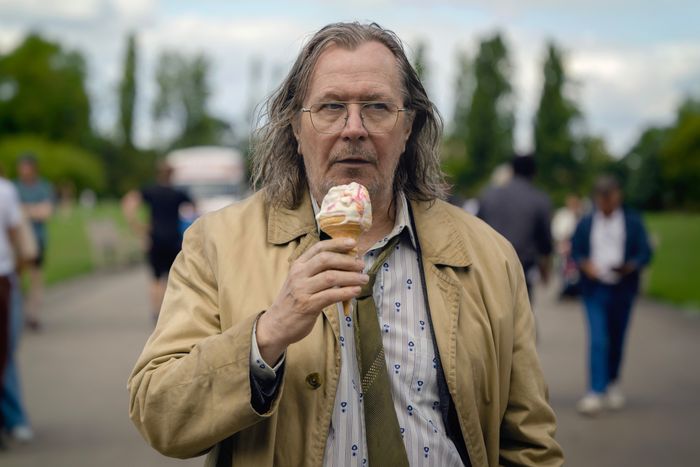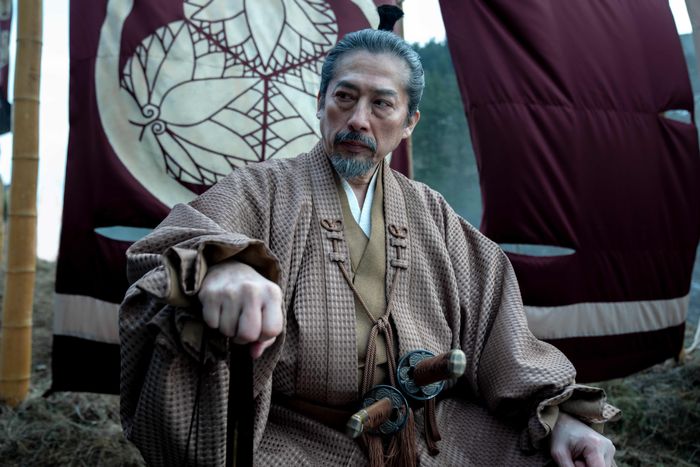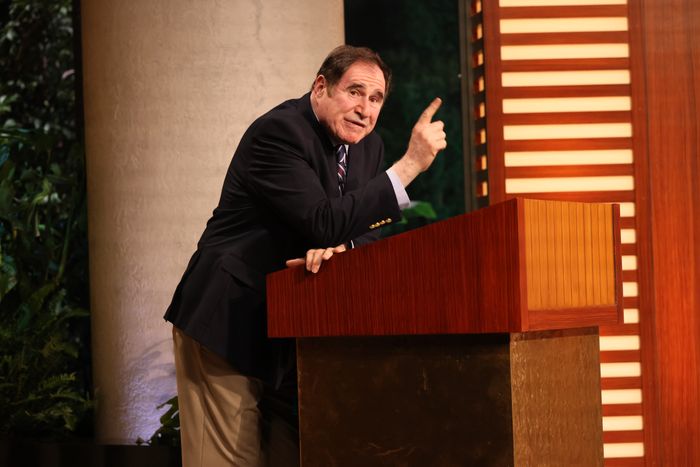
It was around the time that Academy Award–winning actor Gary Oldman ripped a fart so rank and toxic that the car he was riding in had to be evacuated that I thought, Slow Horses should get every Emmy nomination available to it. And it looks like I might actually get my wish this year. The Apple TV+ drama with the bad title* is three seasons in, and for the first time, it’s getting buzz as a serious Emmy contender. If you’re wondering, “Why?,” it’s because you haven’t seen the show. If you’re wondering, “Why now?” — especially considering the monster roster of series Apple is working with this year — that’s worth digging into.
The easiest way to get onboard with Slow Horses as an Emmy contender is to watch it; the entire series has only aired 18 45(ish)-minute episodes across three seasons. This well-plotted London-set spy series burrows its audience into the politics and skullduggery inside MI5 via a pack of misfit agents and analysts working out of Slough House (hence the derogatory moniker Slow Horses) under the slovenly and incredibly grumpy tutelage of Jackson Lamb (Oldman).
Oldman’s performance is a miracle of controlled filth and subtle goodness. He luxuriates in Lamb’s outer repellence — the unwashed hair, stained and wrinkled clothing, and permanently moist skin is all hair/makeup/wardrobe, but Oldman translates it into a character who lives up (down?) to his exterior. And deep under the surface, past the booze and cloud of noxious gas that seems to follow him everywhere, sits a shrewd mind and still-quite-cunning spy. Oldman allows these qualities to peek out periodically, as in the rare moments when he jumps to protect and defend his band of Slow Horses, a group of motley rejects he spends the rest of his time ridiculing.
That band of rejects includes River Cartwright, an MI5 legacy and fail(grand)son who gets demoted to Slough House in the series premiere after spectacularly screwing up a training exercise. The expectation is that we’ll be following River on his ascent back to the big time, but showrunner Will Smith, working off the novels by Mick Herron, has an absolute ball knocking River down time and again. He’s played by Jack Lowden, whom you know from Dunkirk or Benediction or dating Saoirse Ronan, and his pretty, pretty face pretty much exists to take punishment on this show. River’s been beaten, stun-gunned, tied up, left for dead, and blown up with a grenade. Again, it’s only been 18 episodes.
In addition to Oldman (who will compete as a Lead Actor) and Lowden (who will go Supporting), the other most likely Emmy contender is Kristin Scott Thomas as high-ranking MI5 director Diana Taverner, a consummate operator maneuvering her way to the top spot at the Park despite Slough House fucking it up for her at every turn. I’d also throw my weight behind a strong push for Freddie Fox in the Guest category; his slimy James “Spider” Webb (a Taverner acolyte turned private-sector contractor) gets a spectacular showcase and literal mic drop before sailing off into the sunset.
As many shows do these days, Slow Horses blurs genre lines. Though it will be competing as a Drama, Oldman’s performance is hugely comedic, which in years past might’ve thrown voters for a loop or caused them to shift their support behind more traditionally dramatic performances. Recall how Shameless’s William H. Macy consistently got ignored by the Television Academy before Showtime started submitting it as a comedy in 2014, at which point Macy was nominated the next five straight years and six in total.
But several things fall in Oldman’s favor this time around. For one thing, he’s Oscar-winning actor Gary Oldman. His reputation carries with it dramatic heft that will help with voters. For another thing, the last decade has really softened voters to the idea of comedic performances winning in Drama (look no further than Matthew Macfadyen winning for Succession). Then there’s the matter of his competition. As we have mentioned every week in this newsletter — and may well mention every week until at least nominations — the Drama categories are squishy as heck. Even with this week’s news that Shōgun will be joining the Dramas (see below), there are now only two sure things in Shōgun and The Crown, and it’s very possible support for The Crown will be soft after an underwhelming final season. Right now, Oldman sits behind only Shōgun’s Hiroyuki Sanada in terms of nomination odds.
So, does Slow Horses’ comedic streak outweigh the more dramatic parts of the show — all the hostage-taking and warehouse raids and major characters getting killed? Would calling it a comedy lead more people to check it out? In a way, Slow Horses is the ideal blend of all three of the Emmys’ top genres: It has compelling forward plot momentum like a drama; it’s got crack timing for jokes and ridiculous character beats like a comedy; and it’s structured like a limited series. Seasons last six episodes and tell one contained story, with the next season taking on a new crisis or plot. The episodes release over the span of five weeks, meaning you won’t burn the whole show off in a single weekend, but you also aren’t committing yourself to three months of TV for a plot that can be dispatched in half that time. You even get a trailer for the next season at the end of the current one.
To review: farting Oscar winner, pretty boy in peril, compact season schedule, laughs and thrills in equal measure. All this plus Mick Jagger singing the theme song — “Strange Game,” written expressly for the show — like an exaggerated parody of Mick Jagger. Incredible stuff. Best show on TV some weeks.
*Sure, Slow Horses makes perfect sense within the context of the show. But in a television marketplace where there are too many series vying for eyeballs and TV dramas are frequently overlong and move like molasses, you can’t afford to put the word “Slow” in your title. Especially when this particular show is anything but overlong or snoozy!
In Shōgun News
As we noted last week, Shōgun star Hiroyuki Sanada had extended his contract with FX, a sign that pointed directly toward an impending announcement that the limited series, based on James Clavell’s novel, would be returning for additional seasons. This week, FX and Hulu announced they are working with the James Clavell estate on two more seasons of the show.
For Shōgun fans, this is a mixed blessing, as reflected in our Vulture discussion. Is it better for a good show to end well, or do we always want more of a good thing? Regardless, this will shake up the Emmys race in a very significant way. Until now, Shōgun was widely predicted as the front-runner in the Limited Series categories. Now, those categories are up for grabs among shows like FX’s Fargo, Apple TV+’s Lessons in Chemistry, and Netflix’s Ripley and Baby Reindeer.
Meanwhile, the Drama categories, which up until now were looking like The Crown’s to lose, shift significantly with Shōgun in the mix. After attracting 9 million views on Hulu and beating The Bear’s numbers for that platform’s most-watched premiere, Shōgun’s buzz has been impeccable. Hiroyuki Sanada, Cosmo Jarvis, and Anna Sawai received raves for their performances, and the series as a whole was one of the best-reviewed shows of the season. The Crown has a real battle on its hands now.
In “Can We Give Richard Kind an Emmy Too?” News
John Mulaney’s Everybody’s in L.A. was a buzzy hit for Netflix last week — it certainly had the Vulture staff whipped up into a frenzy — so it makes sense that the streamer would want to capitalize on that by considering its Emmy chances very carefully. To that end, Netflix has decided to change course and submit Everybody’s in L.A. into the Variety Talk Series category, rather than Scripted Variety Series.
Mulaney’s show — which ran for six consecutive nights of live programming and included interviews with guests, pretaped sketches, Richard Kind, musical performances, children dressed as celebrities, Richard Kind, Saymo the delivery robot, live call-ins, Sarah Silverman bullying John’s bewigged hypnotherapist, and Richard Kind — would have originally competed against the likes of Saturday Night Live and Last Week Tonight With John Oliver in the Scripted category. In Talk Series, he’ll go up against the more traditional late-night powers like Stephen Colbert, Seth Meyers, and various Jimmys.
Logically, this makes the most sense. While there were scripted sketches in play, the entire premise of Everybody’s in L.A. was the live-TV aspect of it and the freewheeling nature of the celebrities-on-the-couch material, all of which was very much unscripted. Strategically, this also clears Mulaney from the Emmy juggernaut that is John Oliver. That said, there’s no guarantee Emmy voters will go for Everybody’s in L.A. no matter which category it’s in. The late-night categories are notorious for getting boringly carbon-copied year after year. (Only the Reality Competition category is more dull; yes, I mean you, Ru.) Maybe a show like Mulaney’s will be different enough to shake voters out of their fugue state.




